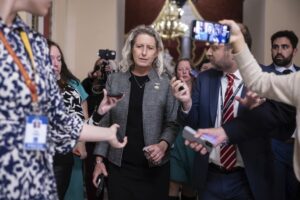Innovative Housing Program Offers Hope and Challenges for Residents
On a journey that began with instability, Becca Morris is now on the brink of home ownership in Harrington, Delaware. Her story is one of perseverance, bolstered by a unique housing subsidy program that emphasizes savings and self-sufficiency.

Becca Morris in the home she’s in the process of buying in Harrington, Delaware, on May 14, 2026. She found it just a few months before her federal housing subsidy was set to end.
Wesley LaPointe/for NPR hide caption
toggle caption
Wesley LaPointe/for NPR
Years ago, Morris applied for federal housing assistance amid personal upheaval. As a young mother, she juggled instability and uncertainty, yet welcomed the condition that the subsidy would last no more than seven years. “I feel like this was … good pressure,” she reflects, a catalyst that encouraged her to return to school and improve her circumstances.
The subsidy allowed Morris and her son to reside in a modest two-bedroom home in Bridgeville, Delaware. Despite the coziness, space was limited, prompting her desire for a larger home. The seven-year deadline has since passed, partly due to COVID-19, but the program offered more than just a countdown.

The house on the right is where Becca Morris and her son live in Bridgeville, Del. The state has one of the few housing authorities in the country with the power to impose a time limit and work requirement in exchange for a housing subsidy.
Wesley LaPointe/for NPR hide caption
toggle caption
Wesley LaPointe/for NPR
The Delaware State Housing Authority, one of the few agencies with the ability to impose work requirements and time limits on housing subsidies, plays a crucial role. Yet, the Department of Housing and Urban Development aims to broaden this authority, as indicated by an internal document seen by NPR. An agency spokesperson mentioned that President Trump’s budget proposal featured a two-year time limit to promote self-sufficiency.
Critics argue there’s little evidence that such limits enhance employment or reduce dependency on subsidies. Concerns arise that many might suffer as rent prices continue to soar.
Beyond Time Limits: A Holistic Approach

Becca Morris, in her living room, calls the time limit on her housing subsidy “good pressure.”
Wesley LaPointe/for NPR hide caption
toggle caption
Wesley LaPointe/for NPR
Morris’ experience with the Delaware program highlighted the importance of work requirements and consistent financial monitoring. Unlike typical housing subsidies that adjust rent with income changes, Delaware’s program maintains stable payments, allowing participants to save. The savings are collected in an interest-bearing account, accessible upon leaving the program.
“I would have been literally paycheck to paycheck this entire time,” Morris noted, emphasizing the program’s role in facilitating her financial growth. The program’s structure enabled her to save without working excessive hours.

Photos of family members, including Becca Morris’ son, Jayden, decorate a bulletin board in her bedroom.
Wesley LaPointe/for NPR hide caption
toggle caption
Wesley LaPointe/for NPR
A two-tiered time limit permits participants to save fully if they exit within five years. However, those needing more time face a penalty. Morris utilized this additional period but remains financially content. “I was able to save more staying here with the lower rent,” she explains.
Morris’ journey was eased by flexibility in deadlines, with extensions granted due to her wrist injury and the pandemic. She also benefited from reduced rent while completing her nursing degree.

The kitchen in Becca Morris’ home. She was able to stop working for more than a year — and get a break on her rent — to complete a nursing degree.
Wesley LaPointe/for NPR hide caption
toggle caption
Wesley LaPointe/for NPR
After nine years, Morris and her son prepare to transition from their current home. “Yes, the stars align to the grace of God,” she remarks. “Everything worked out perfectly.”
Time Limits: A Double-Edged Sword
A significant concern for housing assistance is the limited availability, with only a quarter of eligible individuals receiving aid. This scarcity drives the advocacy for time limits, aiming to facilitate housing turnover and accessibility.
“Once you get a housing subsidy, it’s for life. So as a result of that, there are extremely long waiting lists,” comments Howard Husock from the American Enterprise Institute. His perspective emphasizes the need for turnover to aid those still in need.

A water tower stands above downtown Bridgeville, Del. A number of other local housing authorities have ended time limits, after finding that renters’ incomes didn’t increase enough to afford market-rate housing.
Wesley LaPointe/for NPR hide caption
toggle caption
Wesley LaPointe/for NPR
However, not all experiences with time limits are positive. Tacoma Housing Authority in Washington state implemented a five-year limit in 2013 but reversed the decision in 2022. Rising rents hindered residents’ ability to save, prompting the authority to prioritize housing over time constraints.
Tacoma’s analysis revealed that those with unrestricted vouchers better increased their incomes, leading to the end of time limits.
Support Systems: The True Catalyst

Morris’ street in Bridgeville. The head of the Delaware State Housing Authority says a time limit gives renters a sense of urgency but an automatic savings plan and other support is what really helps them get ahead and move on.
Wesley LaPointe/
This article was originally written by www.npr.org
- HUD proposes time limits and work requirements for rental subsidies
- Virginia Rep. Kiggans defends GOP bill despite CBO’s Medicaid concerns
- Sandy Hook Families Frustrated as Alex Jones Bankruptcy Drags On
- Trump Signs New Travel Ban Targeting Multiple Countries
- Trump Signs Proclamation Restricting Travelers from 12 Countries







Be First to Comment